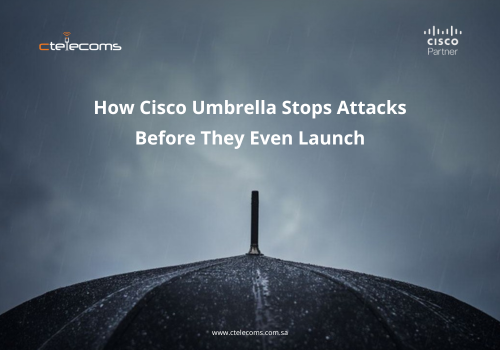

2025/06/01 IT & Cyber-Security Solutions 1105 visit(s) 2 min to read
Ctelecoms

Forget simply reacting to cyberattacks. These days, online threats are launching faster and getting more complex than ever. To truly protect ourselves, we can't wait for trouble to arrive; we need to spot it brewing and shut it down immediately. That's the power of Cisco Umbrella's predictive threat intelligence – it's designed to see the danger long before it reaches your network, stopping attacks in their tracks.
Imagine having a crystal ball for the internet, one that shows you where future attacks are going to happen. While no technology is a crystal ball, Cisco Umbrella comes close by using something called recursive DNS.
Every time you click a link, open an email, or access a cloud application, your computer performs a DNS lookup to translate a human-readable domain name into a machine-readable IP address. Cisco Umbrella sits at this critical junction, processing a massive volume of these DNS requests daily.
This unique position allows Umbrella to observe the internet's pulse and identify patterns that indicate malicious intent. It's not just looking for known bad actors; it's looking for the precursors to an attack.
1.Mapping Attacker Infrastructure: Think of attackers as setting up a new "base of operations" online. They register new domains, provision servers, and establish command-and-control channels. Umbrella's sophisticated algorithms analyze these activities in real-time. It can identify:
oNewly Registered Domains (NRDs): Many phishing campaigns and malware distribution networks use freshly registered domains to evade detection. Umbrella quickly flags suspicious NRDs that exhibit characteristics common to malicious infrastructure.
oDNS Request Patterns: Unusual spikes in DNS requests to certain domains, or queries from compromised machines to known malicious IP addresses, can be early warning signs.
oCo-occurrences: If multiple suspicious domains or IPs are frequently queried together, it can indicate a shared malicious infrastructure.
2.Uncovering the Relationships: Cisco Umbrella uses the information about threats from Cisco Talos (one of the world's top threat research groups) to see the big problem. It makes sense of all the different parts. Talos is always researching and understanding the complex relationships between:
oMalware: How new strains are behaving and what domains or IPs they communicate with.
oDomains: Their reputation, their history, and their associations with other malicious elements.
oIP Addresses: Which IPs are serving malware, hosting phishing sites, or acting as command-and-control centers.
oNetworks (ASNs): Identifying entire networks that are known to host a disproportionate amount of malicious activity.
Umbrella can identify and predict emerging threats by understanding these connections. If a new domain is registered and starts showing patterns like past phishing campaigns, or if it points to an IP address that has been linked to malware in the past, Umbrella can block it before anyone in your organization tries to access it.
This ability to predict problems is a big deal for cybersecurity. Instead of waiting for a user to click a harmful link and potentially get infected, Umbrella can prevent that connection from ever happening. It stops traffic to known and new harmful websites at the DNS layer, no matter if your users are on or off the company network.
When it comes to protecting your business, you need the best. As a trusted Cisco Premier Partner, Ctelecoms delivers Cisco Umbrella's cutting-edge solutions. This essential layer of defense acts as your first line of security, significantly boosting your organization's safety and resilience.
Choose Ctelecoms, among the top IT security companies in KSA, to fortify your defenses and ensure your organization, from Riyadh to Jeddah and beyond, is protected against tomorrow's threats. With Ctelecoms, the leading IT company in KSA, you're not just getting a solution; you're gaining a partner committed to your long-term security.